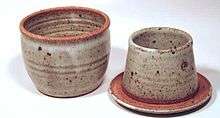French butter dish

A French butter dish is a container used to maintain the freshness and spreadable consistency of butter without refrigeration. This late 19th century French-designed pottery crock has two parts: a base that holds water, and a cup to hold the packed butter which also serves as a lid. The cup containing butter is placed into the base, where water creates an airtight seal that keeps the air (and thus oxygen) away from the butter so that refrigeration is not needed, and the butter can be used in its soft form. This method will keep butter for around a month provided it is kept at temperatures below 80 °F (27 °C) and the water is changed regularly.
Other names for this item are: "French butter keeper", "French butter crock", "butter crock", "beurrier à l'eau", "beurrier Breton", "beurrier Normand", "cloche de beurre", "pot à beurre Breton", "französische Butterdose" (German). Two manufactured versions are the Norpro butter keeper and the Butter Bell, a registered trademark of L. Tremain, Inc.[1][2]
History
The French butter dish design is thought to have originated in Vallauris, France. Vallauris is known for its pottery crafts. Others speculate that it was created in Brittany, or Normandy—both known for their butter production.
In the 1970s and 1980s, craft potters began producing and marketing the French butter dish throughout the United States at craft fairs and in art boutiques.[1] "French Butter Dish" became the preferred name in the USA around that time and was later adapted by potters in Europe.[3] By the end of the 20th century, French butter dishes became popular enough for manufactured versions to appear.
References
- 1 2 Jim Sloss. "A potters history with the french butter dish". James Sloss Pottery. Retrieved 29 December 2012.
- ↑ "Butter Bell Crock". November 25, 2013. Retrieved 25 November 2013.
- ↑ "French Butter Dish (Butterdosen)". February 25, 2009. Retrieved 29 December 2012.